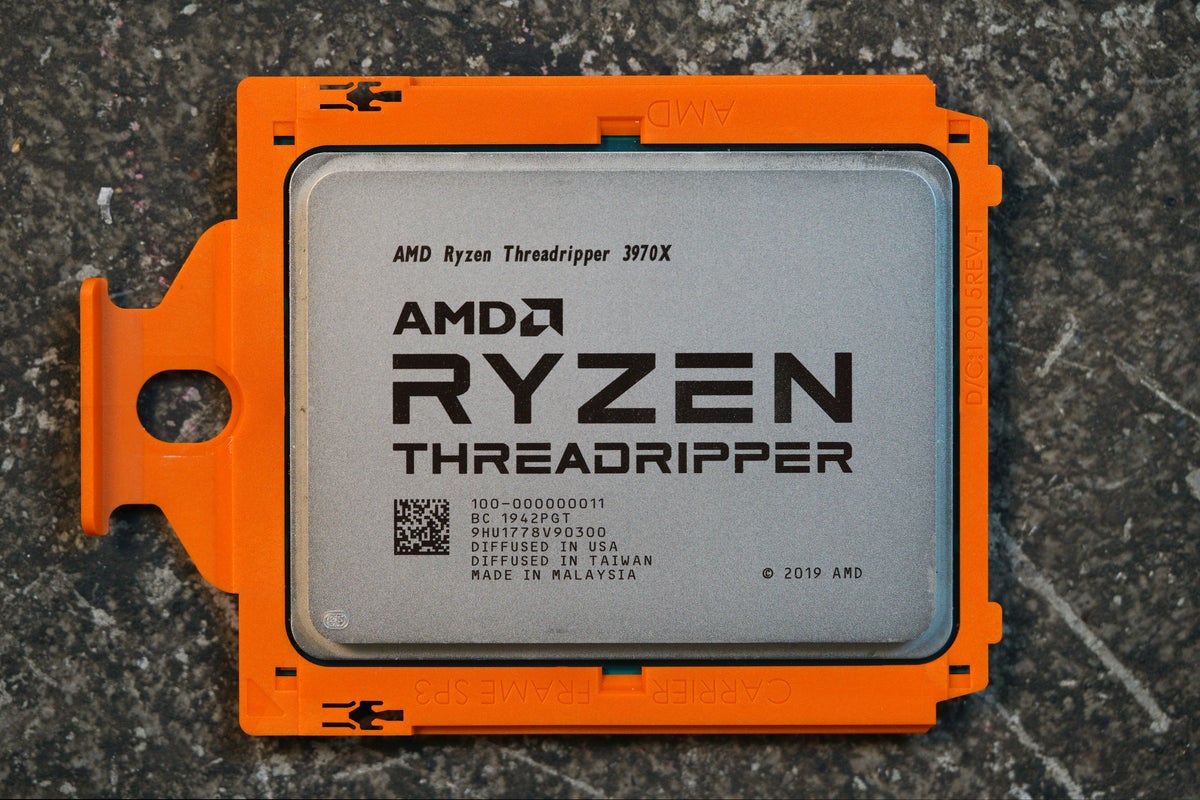It blows away Intel's best.
Executive Editor, PCWorld |
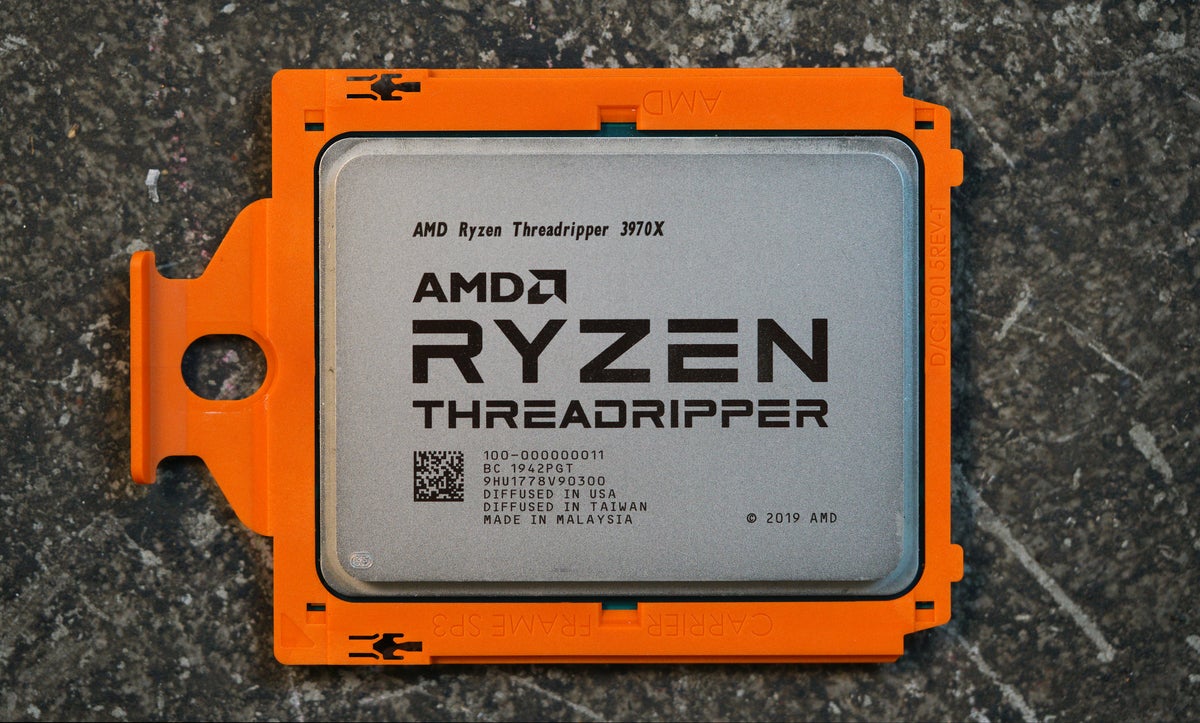
Today's Best Tech Deals
Picked by PCWorld's Editors
Top Deals On Great Products
Picked by Techconnect's Editors
AMD is on a rampage. Its 32-core Ryzen Threadripper 3970X is the monster rising out of the sea to level Intel’s prosumer chips. This is just weeks after the company’s 16-core Ryzen 9 3950X cleaned the clock of Intel’s top consumer chips.
Note that “prosumer” means Threadripper is designed primarily for graphics-intensive design and content creation tasks, rather than gaming. (You could play games with this chip, but it's massive overkill.) AMD has an opportunity in this space, because the Xeon CPUs Intel makes for the same market are far more expensive. And this is just the beginning of AMD’s attack on the high end: On Monday morning, AMD confirmed that it will make a 64-core chip as well.
If you can “just get by” in the meantime with a 32-core Ryzen Threadripper 3970X that pretty much crushes all, put your seat belt on and keep reading for tech specs, benchmarks, and more.
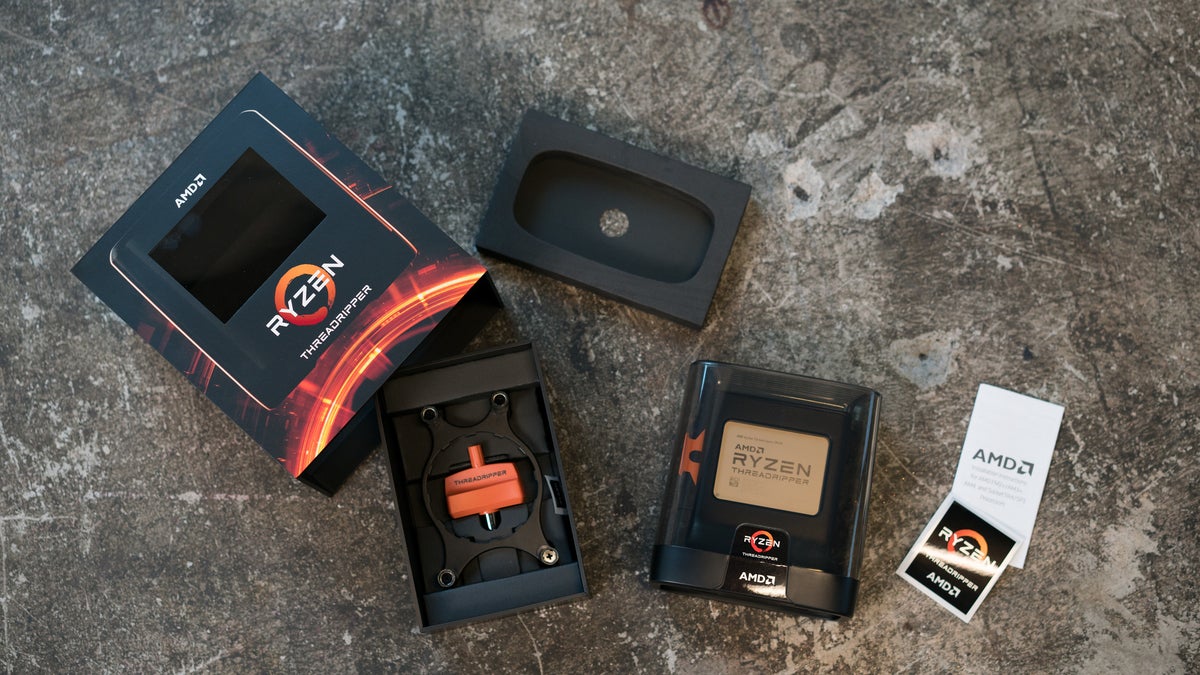 Gordon Mah Ung
Gordon Mah Ung
Here’s what you get in your Threadripper box: a torque wrench, sticker, and CLC adapter for Asetek-based cooler designs.
What is Ryzen Threadripper 3970X?
Threadripper 3970X uses AMD’s phenomenal 7nm chips, but its most significant change is its topology. The original 32-core Threadripper 2990WX we reviewed was a little bit of a kludge. The chip was built with four 8-core chiplets, but only two of the chiplets had memory controllers and PCIe access. That meant the two compute-only dies had to go through the other dies to get to RAM or storage. You could think of the design as adding two more bedrooms to your two-bedroom home, but forcing those in the new bedrooms to go through the old bedrooms when leaving. You could imagine how off-kilter this could sometimes make the original 32-core Threadripper 2990WX.
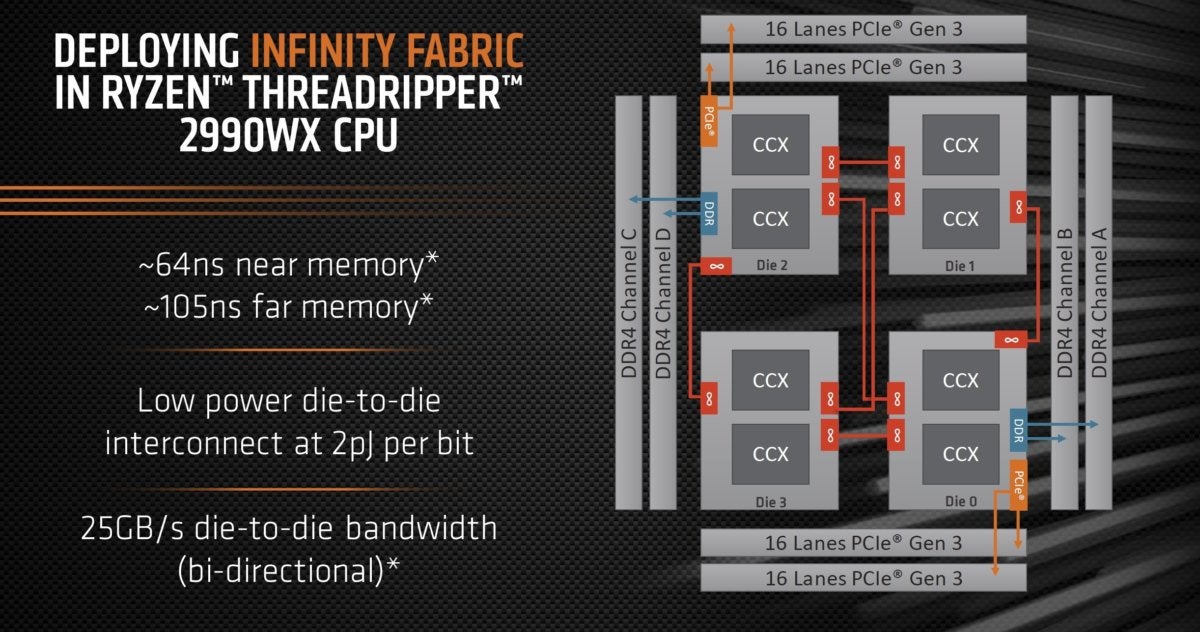 AMD
AMD
The original 32-core Ryzen Threadripper 2990WX features four dies connected by Infinity Fabric. Two of those dies must access RAM and storage through an adjacent die.
With the new Threadripper 3970X, AMD has gone to a single 12nm IO Die that contains all of the access to PCIe 4.0 lanes and the memory controller. The IO Die connects to each compute die using a high-speed fabric, giving each of the CCD chips equal access.
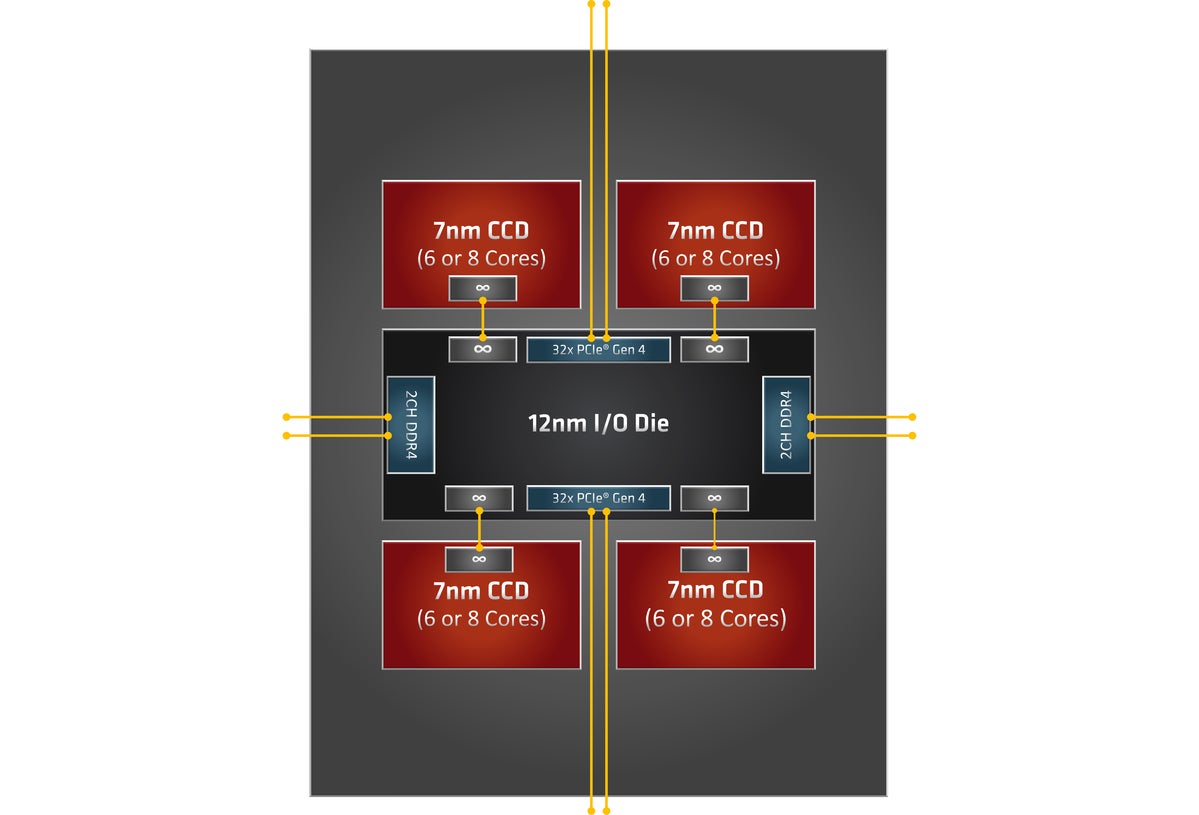 AMD
AMD
AMD’s topology change with Threadripper 3000 chips gives each compute chip equal access to PCIe and RAM.
Same Socket, New Connections
All this probably sounds great—unless you’ve bought into the previous X399-based, Threadripper series. That’s because even though the actual physical socket is the same with the new third-gen Threadripper, they are electrically different.
That means the new chip is incompatible with existing motherboards. Instead, AMD is introducing the new TRX40 platform, which works with the 3000-series and future Threadripper CPUs. Those X399 and 2nd-gen Threadripper chips? They’re essentially being pushed overboard.
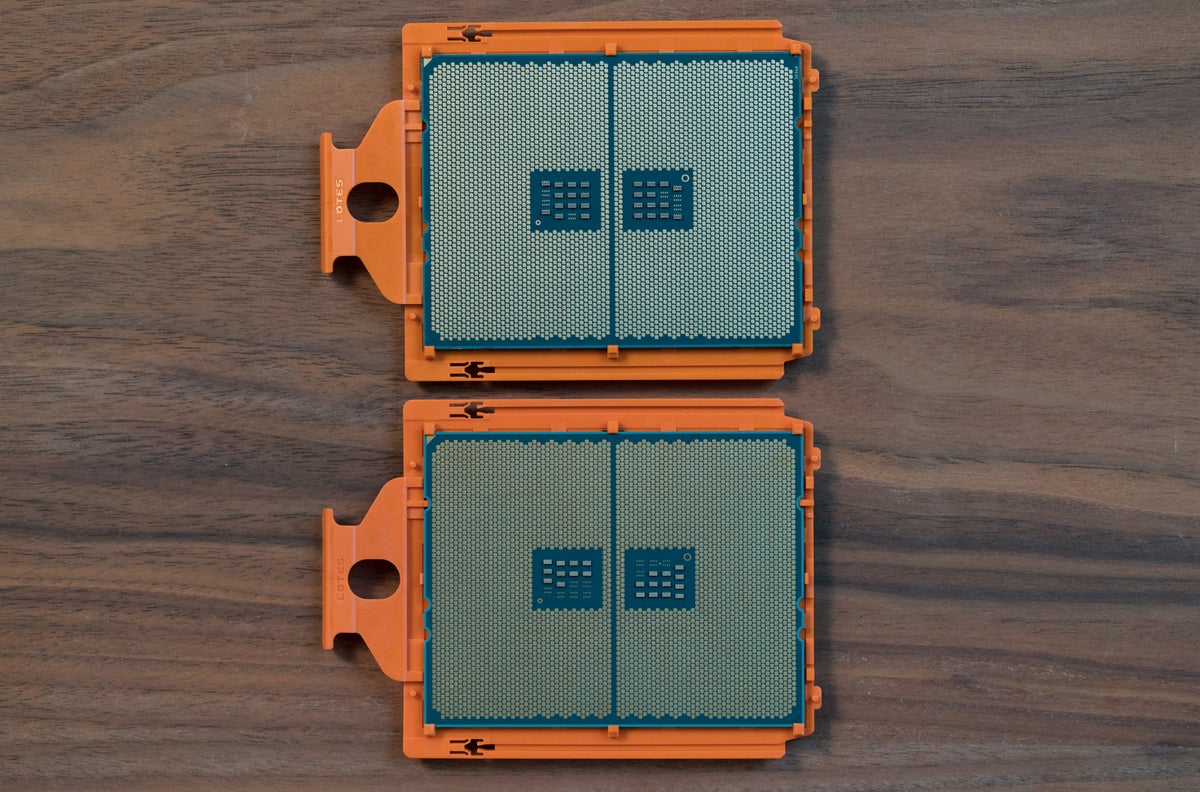 Gordon Mah Ung
Gordon Mah Ung
The orange carrier, and the physical connections are the same between the 2000-series (bottom) and 3000-series Threadripper (top) but they wired up differently so the two are incompatible.
In addition to the new CPU, the TRX40 increases PCIe lanes from 64 to 72. That’s an upgrade and then some, because the 3000-series Threadrippers also move up from PCIe 3.0 to PCIe 4.0. That basically doubles the theoretical bandwidth of each lane, meaning the new TRX40 platform offers the equivalent of 144 lanes of PCIe 3.0 bandwidth.
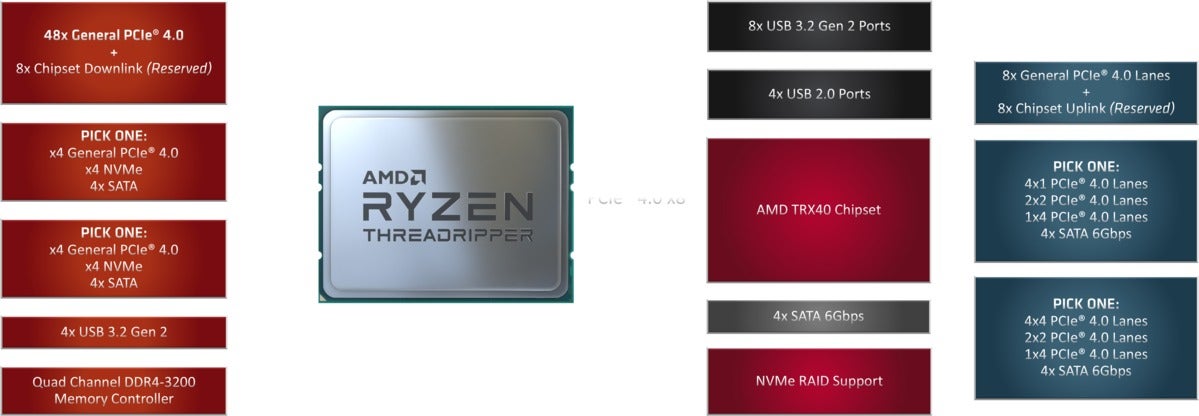 AMD
AMD
The PCIe lanes go from 64 lanes of PCIe 3 to 72 lanes of PCIe 4.0.
How we tested
For our test system, we loaded Windows 10 1903 on a Corsair MP600 PCIe 4.0 SSD and installed a Founder’s Edition GeForce RTX 2080 Ti GPU and 64GB of Corsair DDR/3600 CL15 RAM. We cooled the 32-core Threadripper with a Corsair H110i RGB, with its fans manually set to 100 percent and iCue disabled.
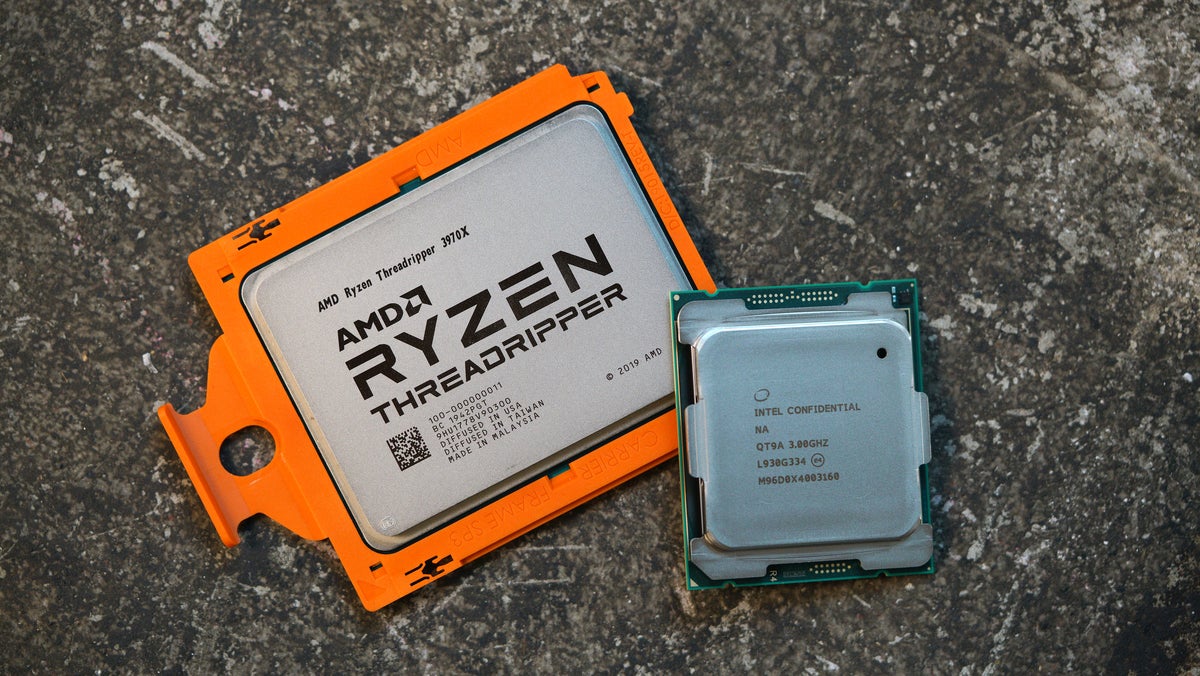 Gordon Mah Ung
Gordon Mah Ung
It’s one big chip: Intel’s new 18-core Core i9-10980XE astride AMD’s new 32-core Threadripper 3970X.
Performance
We’ll kick off our performance tests with the area of computing that always wrings the most out of a multi-core CPU: 3D modelling and rendering.
First up is Maxon’s new Cinbench R20 benchmark. Based off of the same engine in the company’s Cinema4D renderer, Cinebench R20 has been updated to support AVX2 and AVX512 and scales pretty perfectly with core count.
The result below pretty much sets the stage for everything you’ll see from Threadripper in 3D rendering performance across the board.
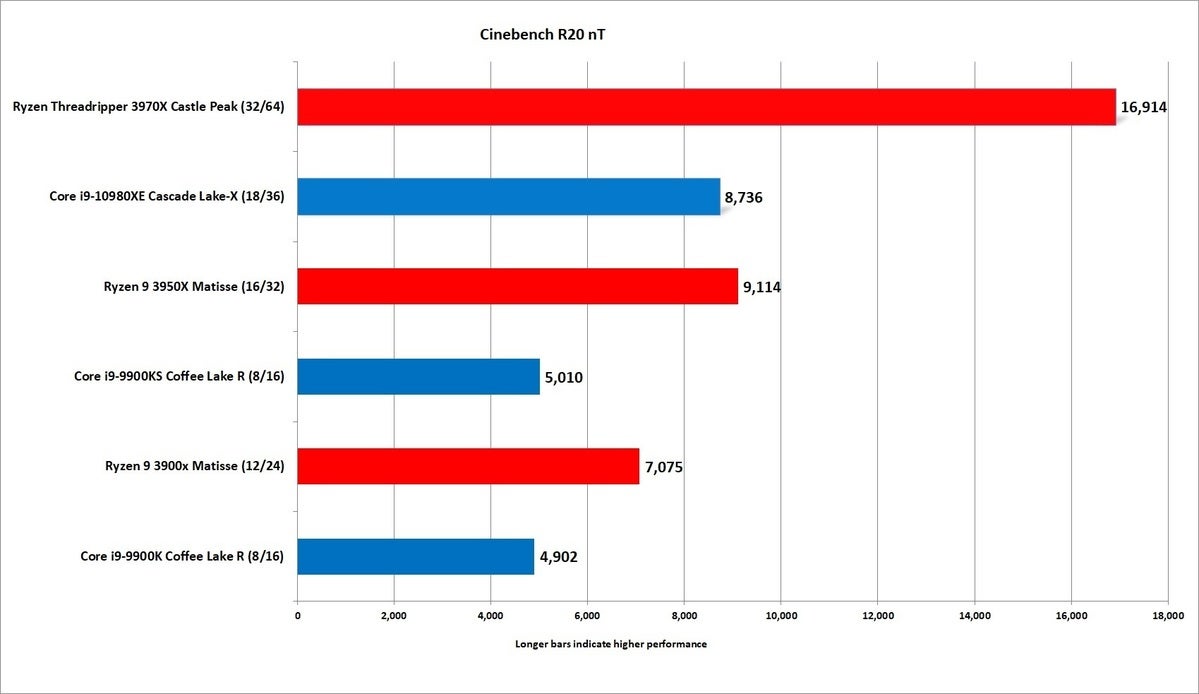 IDG
IDG
For 3D work, nothing is going to outclass the 32-core Threadripper 3970X right now
Despite being a beefy 32-core chip, the Ryzen Threadripper 3970X offers up surprisingly good single-threaded performance too. You can see that represented below, where it’s slightly ahead of the 12-core Ryzen 3900X and just about dead even with the 5GHz Core i9 chips.
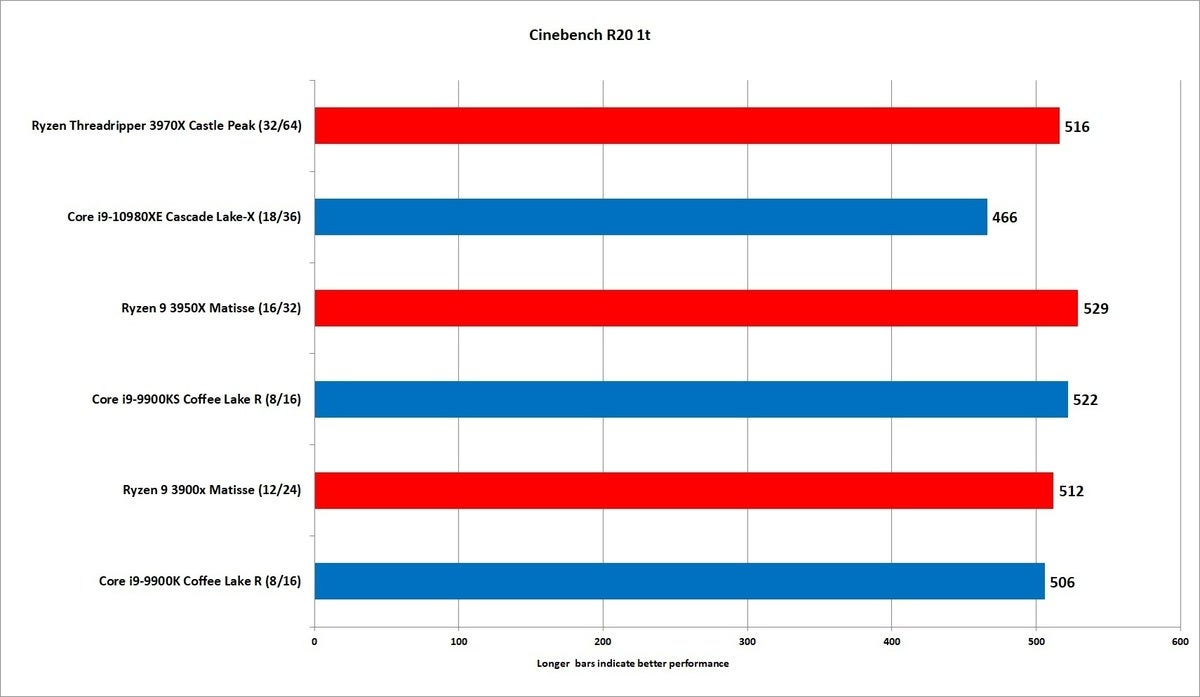 IDG
IDG
The Ryzen Threadripper 3970X is a decent performer on lightly threaded tasks despite packing a ton of cores inside.
Due to time constraints we didn’t refresh our 28-core Xeon W-3175X nor our 32-core Threadripper 2990WX for all of our tests, but the previous Cinebench scores we obtained are still valid. As you can see, even the $3,000 28-core Xeon W-3175X can’t hang at stock speeds against the new 32-core Threadripper. To be fair, running that Xeon W-3175X at stock speeds is almost criminal, but clearly the newest Threadripper rules the day. And yes, the Threadripper 3970X is outperforming the previous 32-core Threadripper 2990WX to the tune of 43 percent!
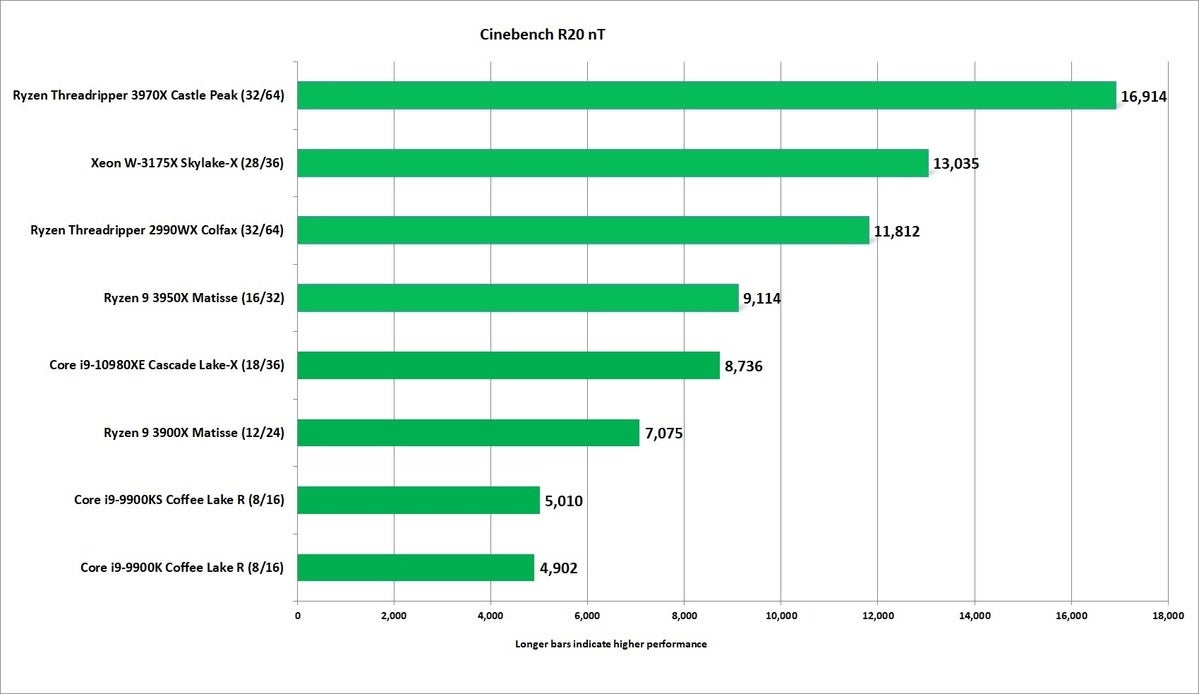 IDG
IDG
The 32-core Threadripper easily blows by Intel’s 28-core Xeon W-3175X and the older 32-core Threadripper 2990WX.
Firing up the “proudly CPU based” Corona renderer, we can see the 3970X outmuscle all other CPUs again. We should note there is some good news here for the new 18-core Intel Core i9-10980XE: It actually outpaces the 16-core Ryzen 9 3950X in a multi-threaded test. The Corona Render is an unbiased renderer, which means no shortcuts are taken to render a scene.
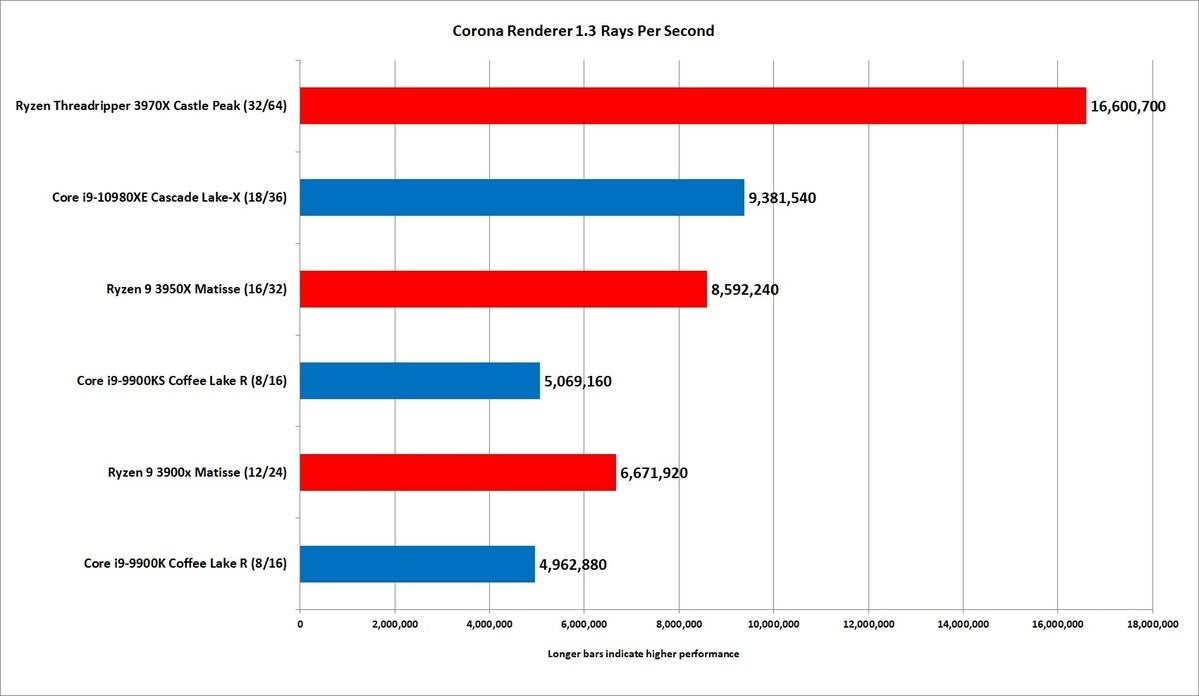 IDG
IDG
If you’re doing 3D modelling, vote for a big, fat CPU.
Next up is the old POV Ray test. The Persistence of Vision ray tracer hearkens back to the Amiga days of yore, but an army of volunteers have kept this free and old ray tracer updated for modern times. As you can see, more cores means more performance, and none of the other CPUs can touch the 32-core Threadripper 3970X.
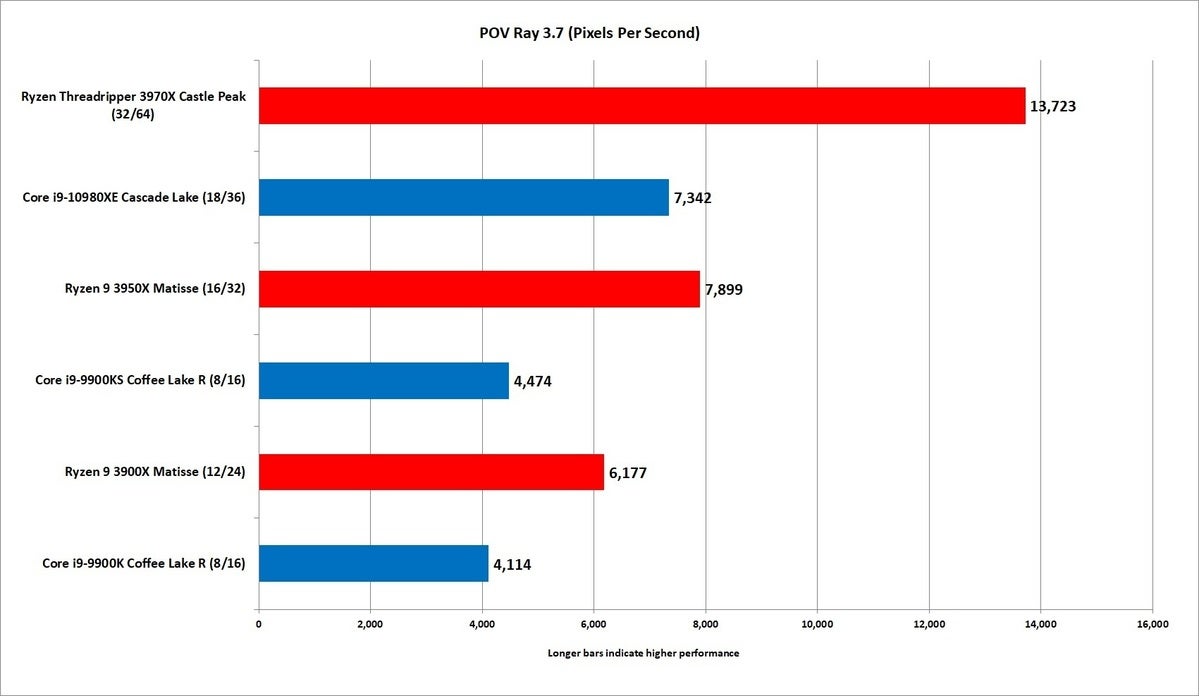 IDG
IDG
POV Ray dates back to the Amiga but has been updated for modern times.
Our next test is V-Ray Next, which is a physically-based renderer that was used on such movies as Avengers: Endgame. V-Ray Next again confirms that the 32-core Threadripper is a monster CPU.
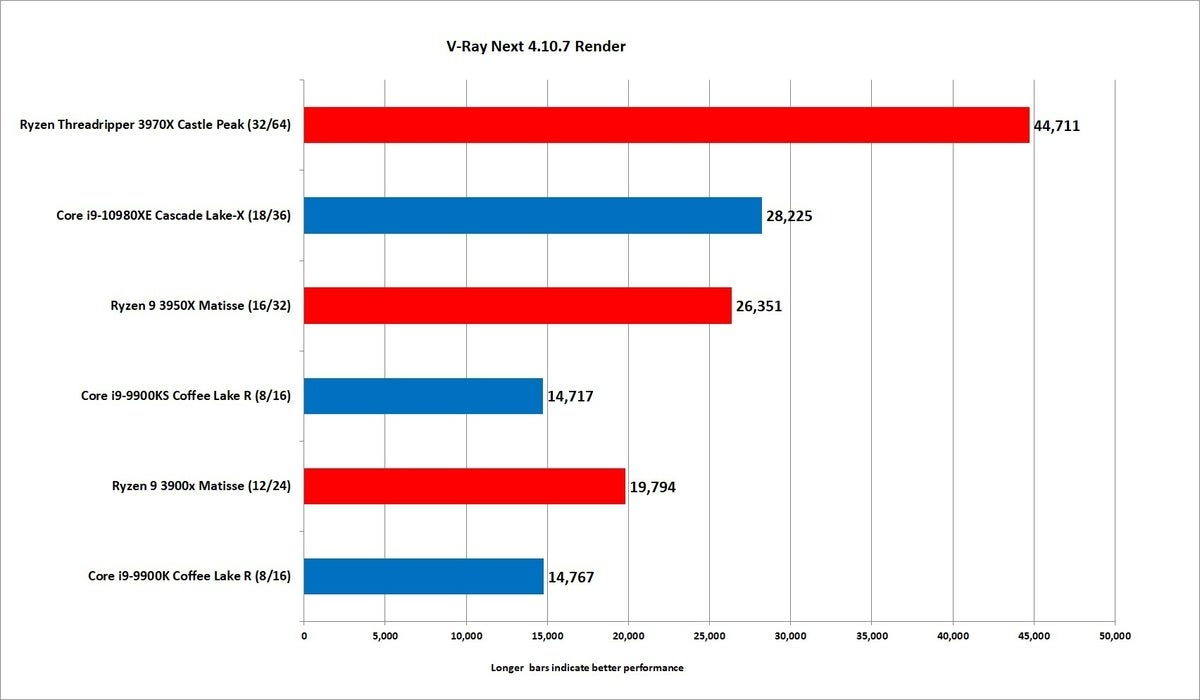 IDG
IDG
V-Ray Next was used to create Thanos in Avengers: Endgame
Our last 3D rendering test shows just how shockingly fast the Threadripper part is. V-Ray Next features CPU-focused workloads as well as a GPU-focused workloads. V-Ray Next also lets you run the GPU-focused workload in a hybrid mode, where you can combine the CPU and GPU or measure the CPU’s performance at the GPU’s job.
We ran this hybrid mode across all of the CPUs below, and also on the Founders Edition GeForce RTX 2080 Ti card. Although the Threadripper 3970X doesn’t beat the mighty GeForce RTX 2080 Ti, it comes surprisingly close.
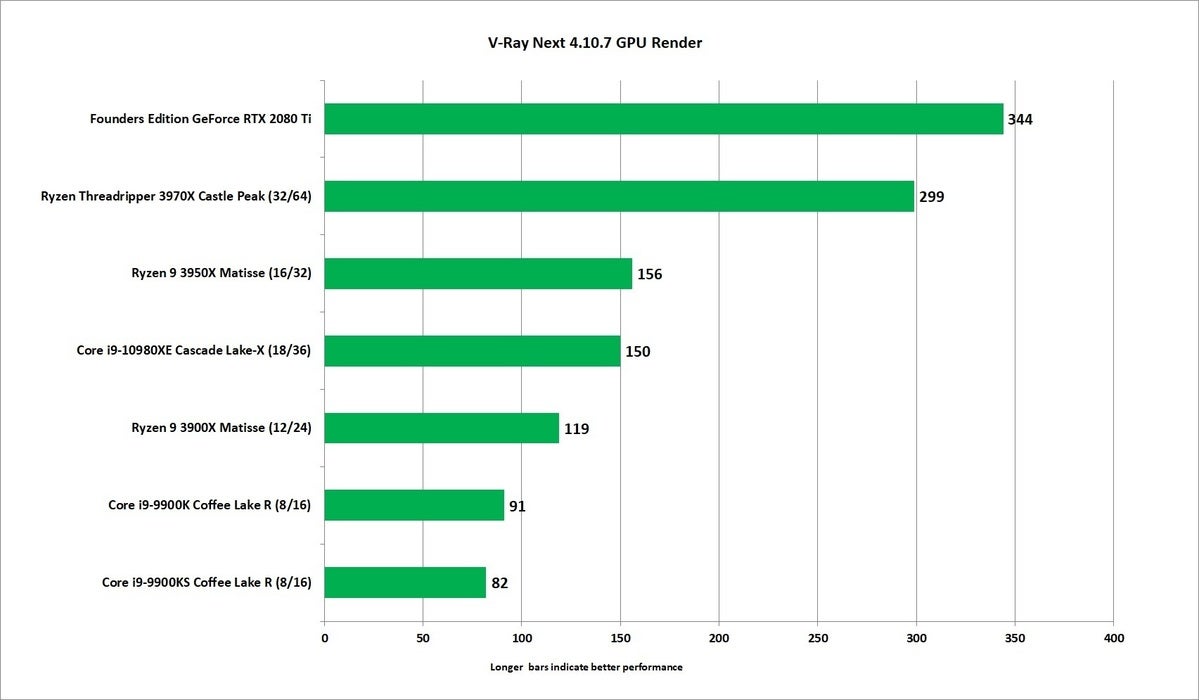 IDG
IDG
The 32-core Threadripper almost pulls even with a GeForce RTX 2080 Ti in V-Ray Next’s GPU rendering test.
Encoding Performance
What you saw above in 3D rendering is where the 32-core Threadripper 3970X was expected to do the best. High core counts don’t translate into the best performance in video encoding and editing, though. Memory bandwidth, special instructions, and other CPU features factor in just as much with video tasks, we’ve found.
For our first test, we use a nightly build of the popular and efficient HandBrake encoder to convert a 4K video file using the HEVC codec. Our first run takes that 4K file down to 1080p. The good news for the Threadripper 3970X is it’s the overall winner. The bad news: The 16-core Ryzen 9 3950X isn’t that far behind.
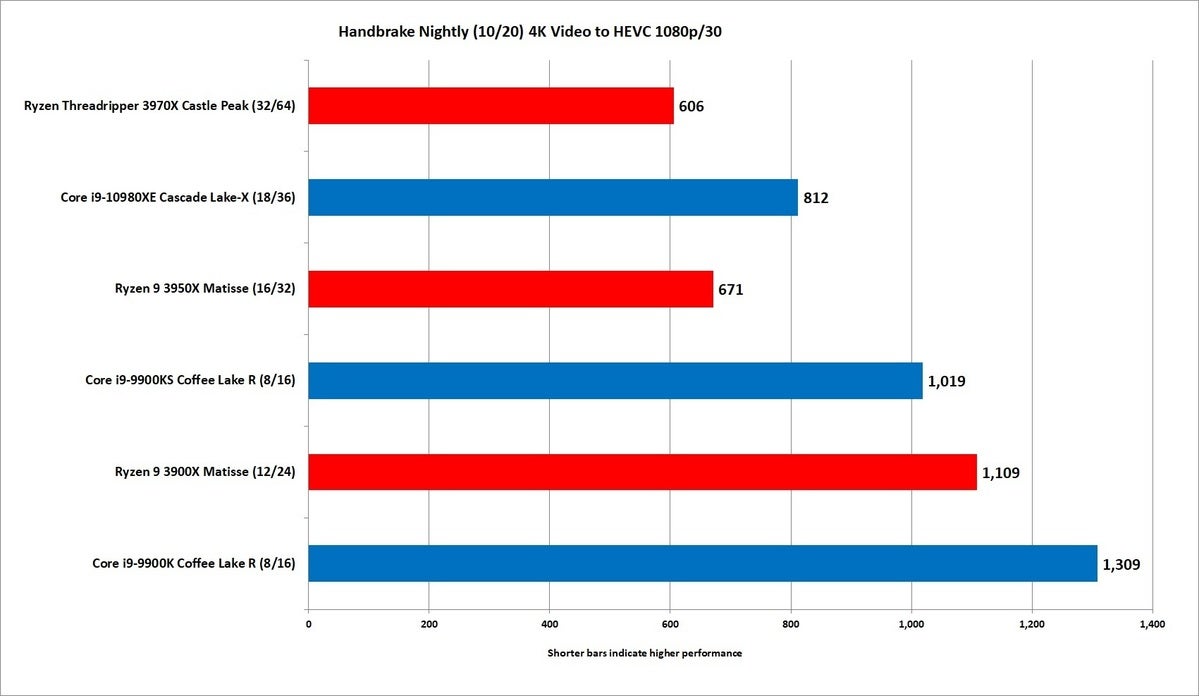 IDG
IDG
The 32-core Threadripper 3970X beats the 16-core Ryzen 9, but not by much.
One thing we know with video transcoding and encoding is the codec, resolution and other video settings make a difference. In the chart below, we take the same workload but rather than select 1080p at 30 fps, we select 2160p at 60 fps. With this workload, we see the Threadripper 3960X open up a 33 percent lead over the Ryzen 9 3950X and nearly a 45 percent gap over the 18-core Core i9-10980XE.
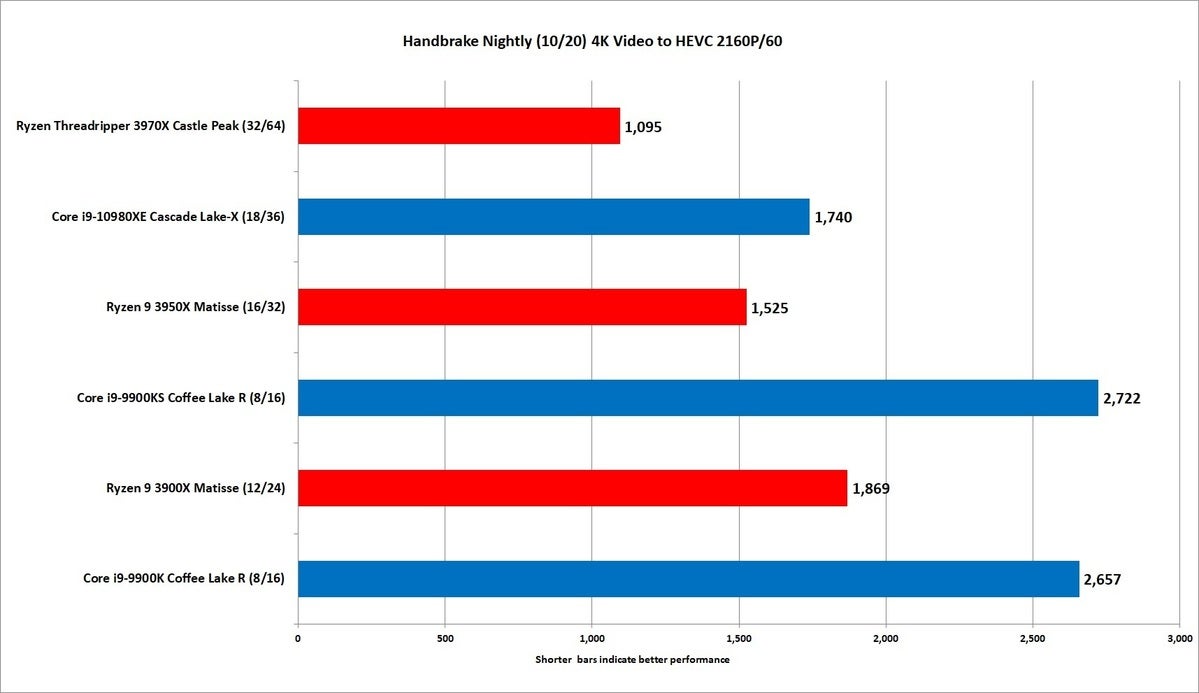 IDG
IDG
At 2160P, the big Threadripper opens up a larger gap over the Intel and Ryzen 9 chips.
Our next video test is Cinegy’s Cinescore 10.4 benchmark. This is a test designed to let broadcast professionals gauge commercial off-the-shelf component performance. It’s designed to fit in memory so as not to be storage-bound, and it tests CUDA performance and CPU performance using various broadcast codecs and resolutions. The overall score is based on each machine’s performance across all of the tests.
As you can see, the 32-core Threadripper opens up a stunning lead. The score is especially a surprise given that the gaps from 8 cores to 16 and 18 cores are far closer.
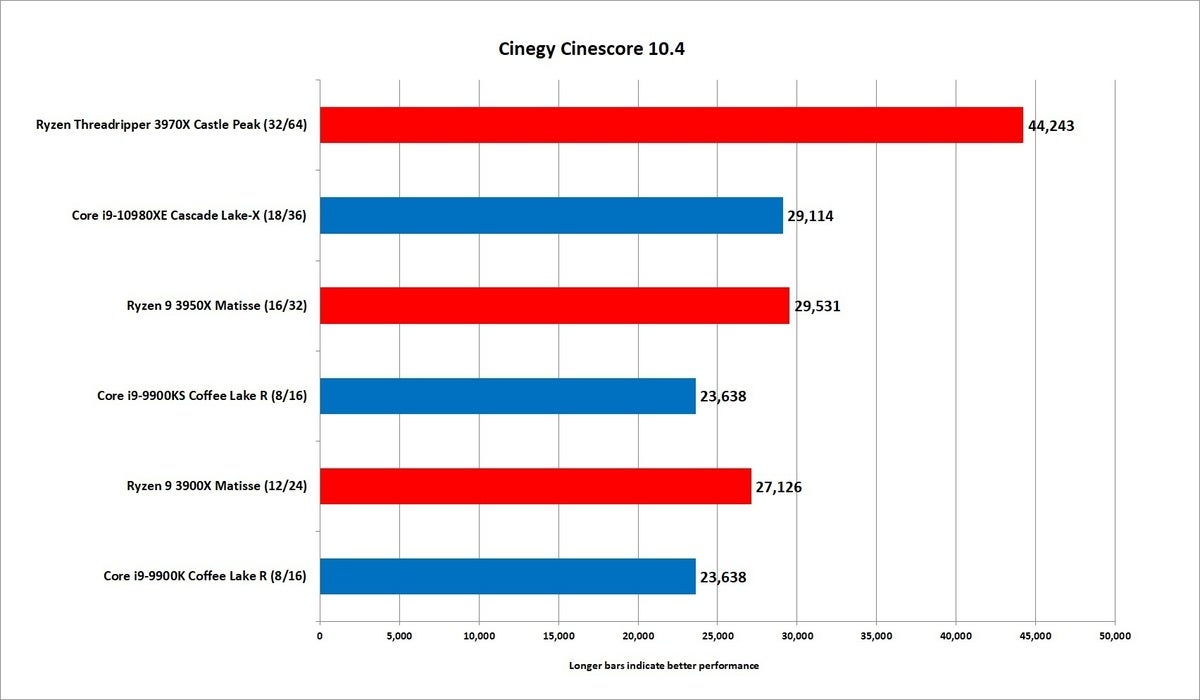 IDG
IDG
Cinegy’s Cinescore is a broadcast-industry test for COTs hardware, and more cores is better.
Our last set of video tests is a little more consumer-focused. For that, we take Adobe’s popular Premiere Pro CC 13.5 and export a video project shot on a 4K Sony Alpha mirrorless camera, using the Blu-ray preset with the maximum render option checked. The winner is the Threadripper, Although it doesn’t scale as perfectly as it does in 3D rendering, we do see a nice progression in performance as we go from 12 cores to 16 cores and 32 cores.
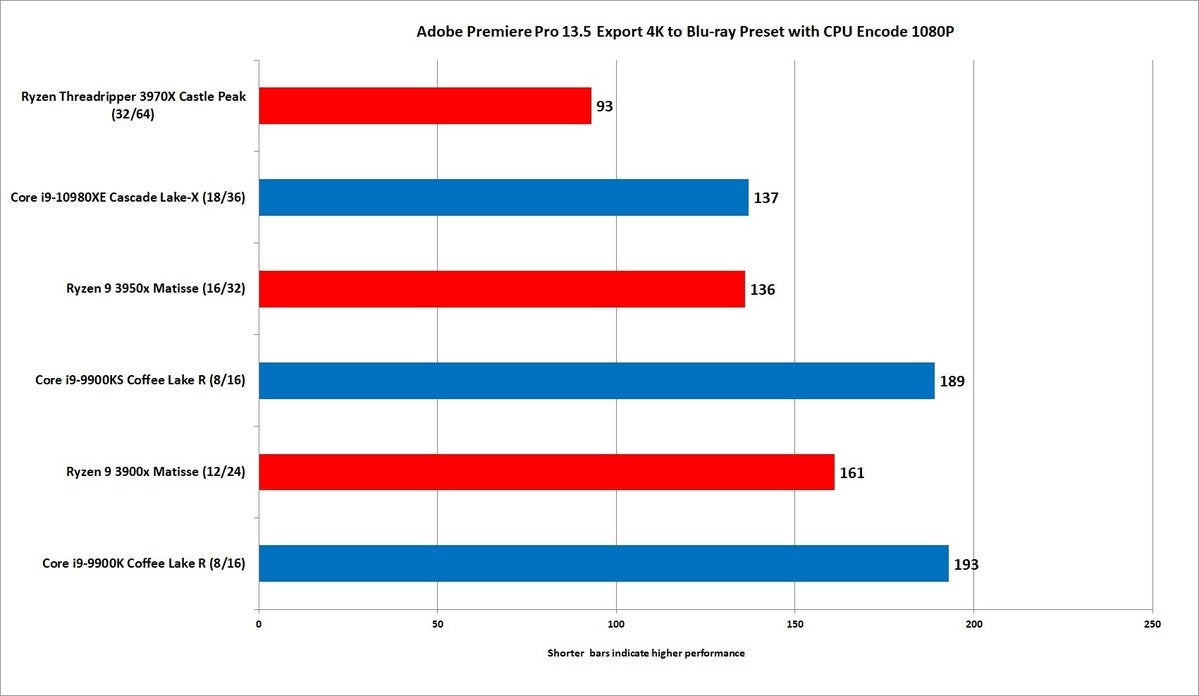 IDG
IDG
We encode a short video shot at 4K resolution using the Blu-ray preset in Adobe Premiere Pro.
We did want to see whether more difficult tasks would result in better performance for the higher-core-count CPUs, so we take the same workload and output it using the HEVC codec instead of Blu-ray’s H.264 in Premiere. This is done with the Maximum Render option and using the High profile. The Threadripper again wins, but the margin is actually slightly less than it is at 1080p resolution and H.264.
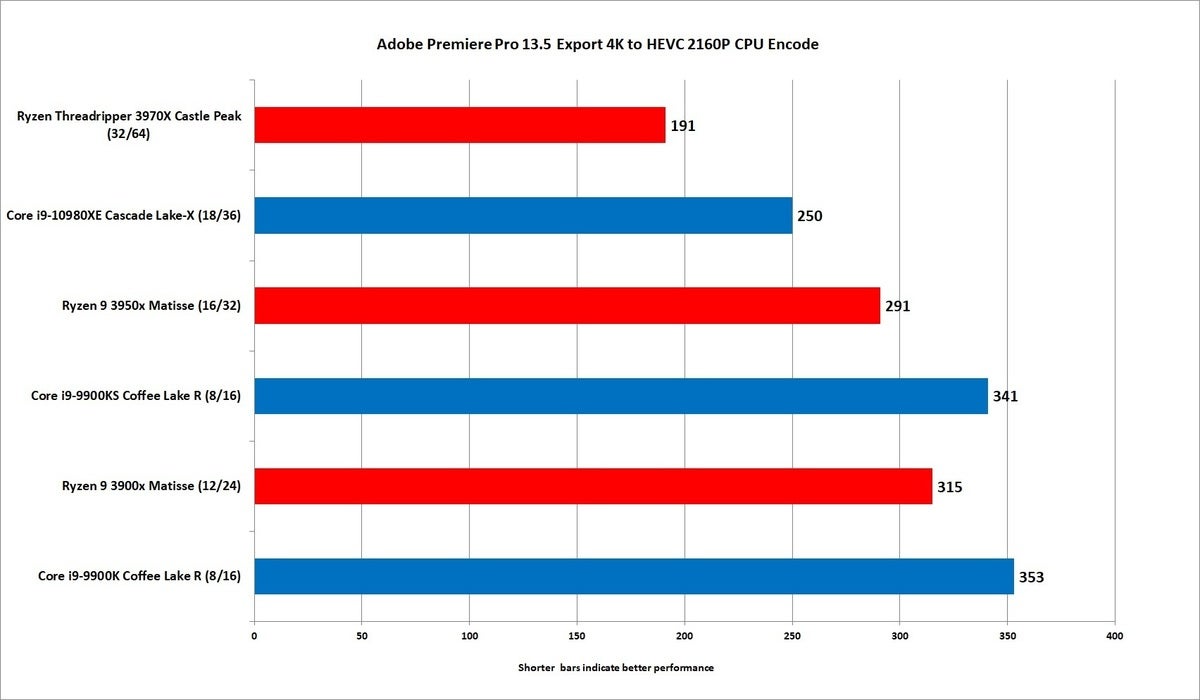 IDG
IDG
Adobe Premiere Pro gives the edge to the Threadripper CPU
Most people who pay for an expensive GPU tend to use that GPU for encoding, so we ran the same test, but rather than force Premiere to use the CPU for encoding, we used the GeForce RTX 2080 Ti. Although the Threadripper technically leads here, we feel the results aren’t conclusive enough to say whether it matters that much.
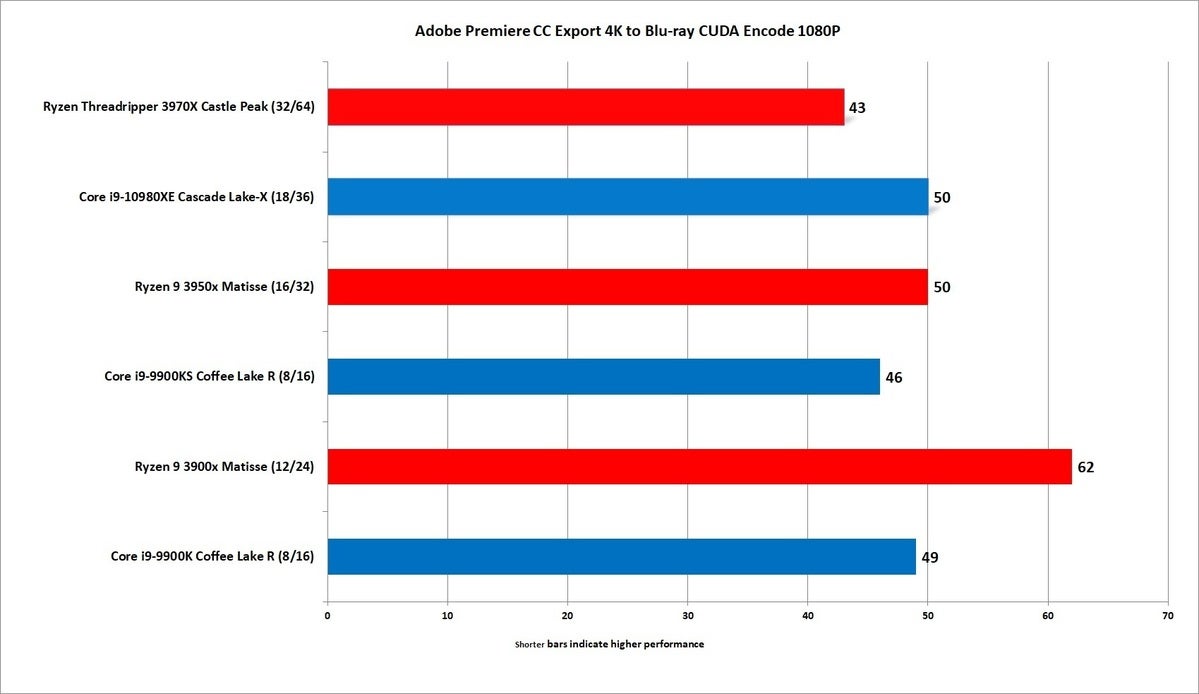 IDG
IDG
GPU-based encoding wasn’t really conclusive, except to say that the GeForce RTX 2080 Ti wins.
Keep reading for more benchmarks, including gaming.
